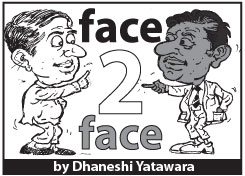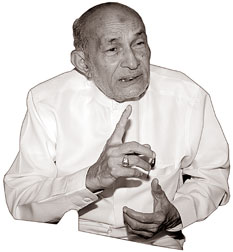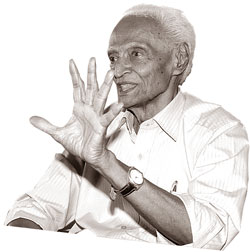The struggles and beyond
 History
is often created with blood and sweat of those crusaders who fought for
justice & rights of our fellow travellers. Where are we heading for as
this process is still continuing, is the subject of this time ‘Face 2
Face’. History
is often created with blood and sweat of those crusaders who fought for
justice & rights of our fellow travellers. Where are we heading for as
this process is still continuing, is the subject of this time ‘Face 2
Face’.
Al Haj Alavi Mowlana Governor, Western Province, Convener
People’s Alliance Trade Union
Bala Tampoe - General Secretary - Ceylon Mercantile,
Industrial and General Union (CMU)
|

Al Haj Alavi Mowlana Governor, Western Province, Convener
People’s Alliance Trade Union |
|

Bala Tampoe - General Secretary - Ceylon Mercantile, Industrial
and General Union (CMU) |
Do you justify people being badly affected due to workers’ strikes
or struggles? Isn’t the employer or the authority that should be
affected?
AM: I do not at all. There should not be any rat-race to
achieve the demands. No one can hold the people to ransom. Whatever the
demands a trade union wishes to achieve, should be gained through the
support of the public. Irrespective of the Government in power, the
trade unions cannot win their demands without hard work and struggle.
It will not be given on a platter. We have come through the hard way.
Even now though I am the Governor, I still appreciate my 53-year long
experience as a trade union activist. The moment I leave this post I
shall go back to perform my duties as a trade unionist.
Today everything is highly politicized. Today we are fighting to
achieve the workers’ rights that our forefathers fought for - Not to
gain anything new. But for any trade union to get a reasonable demand
firstly start with mediation then negotiation and lastly aggression!
That is how it should work.
BT: Firstly, all strikes don’t directly affect the public.
Those that affect, are the essential services, either public or private.
Currently, the private and the public sectors exist side by side.
Sometimes the state may have a monopoly over the services. So, at
times strikes because unavoidable in the essential services as well,
bringing in pressure indirectly on the minister concerned or the
authority. If enough people go on a strike, the authorities cannot put
everyone behind the bars!
It is not a question on justifying, but if you do not go on a strike,
then the authorities will never recognize workers’ necessities. At times
during such strikes, the authorities use the public as ransom and attack
the strikers. But, what is the most important is the reasonable demands
that caused the strike.
In your point of view, how do you think trade unions should work?
Should thy focus on welfare matters or should they carry on with a
political vision?
AM: We are dependent all the time. No one can claim to be
independent.
Even the trade unions depend on political visions. And must seriously
focus on the welfare of the workers. Presently, there is so much
division among the working class as well. This is not favourable at all.
Leaders may come and go but the working class has to go on! Public
support should always be there for worker demands. There were times
whenever we made any demands, we were remanded.
Ministers, bureaucrats and the workers should have a constructive
dialogue periodically. This is a method that should be implemented.
BT: The modern concept is ‘Cooperate Social Responsibility’
(CSR) recognized even by the ILO. This means a cooperate should give
thinking to whatever the policy it follows towards social
responsibility.
This includes the ecological concerns as well. My argument is what
about the workers’ social aspect of life? If the child falls sick, the
mother has to stay back, because people cannot afford to have a domestic
aide. In our Union Office, we give sick leave to the mother when her
child is not well. Employees should be looked at as social beings.
Today ILO stresses on working in favourable work places. Proper
working conditions and wages run parallel. So the unions should look at
all the aspects. In order to enjoy some welfare benefits, for example
free transport and cost of living allowances, the unions are to face a
political struggle. Genuine trade Unions have to be genuine workers’
organizations and should be able to defend and look after the interests
of the working people.
Are there any differences between the situations the private
sector-worker faces as against those of the public sector workers do?
Workers believe that the private sector employees are facing more
difficulties and injustices.
AM: I believe private sector employees may be at the highest
point of exploitation! For the public sector employees their job is
assured. They have adequate leave when they fall sick etc.
But for the private sector employees there is no way out, and one
would not want to face superiors to highlight their difficulties because
the next day they going to be missed out.
The commitment is at such a level in the private sector because the
production has to be brought to the cater to the demands. Therefore,
these workers are getting a very raw deal. We can see much of
exploitation, Overtime work and so on. I believe with regard to the
private sector, still we are lagging behind.
BT: Private sector employees, those who are not state
employees, consists of 60% of the entire working class - including the
self-employed. Trade Unions operate in a very few companies.
Though we, the CMU, have a majority representation in private sector
companies yet we are a minority comparatively. Within certain limits we
can win our demands. Sometimes it is not adequate at all. In the private
sector one can earn more only by sweating more for it. So the workers
pay for the inflation by sweating more and getting more profits to the
owner.
In such situations, how can the private sector workers find relief
or a solution?
AM: The Ministry of Labour is there whatever is said and done
with its own lapses and successers! That is the machinery. Yet it also
needs some improvement and more man-power to effectively function.
Governments may come and go, but the labour department has to stand
up! I believe it stood in this position for the past years.
BT: The only solution to the majority of the private sector
employees who are without the support of the trade unions or backed by
trade unions but without bargaining powers, is the social remedy.
That means the State ought to control the cost of living, provide
housing, provide proper transport and so on. But such is not possible in
a country like ours where the people in control of the State are feeding
themselves and their supporters, which is a minority. The other thing is
that the trade unions should educate their own members.
People say that today’s trade Union struggles are not as strong
and effective as in the past. What are your comments?
AM: There is no collective unity among the trade unions. So
much of divisions we see. It is one of the main reasons for it to lose
its strength it used to have those days. Trade Unions must think
collectively and work together towards achieving their demands. When
there is pollution there can be no solution!
There were divisions among the trade unions throughout. But the
situation was much more improved then. Those days we had stalwart
activists, leaders etc. Now we do not see many except for the very few
who are from a past era. Petty party politics, are damaging to a greater
extent. When one becomes prominent, one loses one’s sight!
BT: Today there are not many workers’ struggles. There was a
time, during the regime of late Prime Minister Dudley Senanayake, from
1965 to 1970 when there were 70 strikes the CMU branches! Mr. Dudley
Senanayake had a personal interview with me at his house and the result
was the enactment of Employment Act. It was the result of the 70 strikes
we launched.
How do you see certain services becoming “essential services”?
AM: Well, we know that this comes with emergency laws of the
country. The emergency laws are there to combat insurgency. While we are
talking here, there is a war going on in the North. We have to
understand that as well. The final weapon should be the trade union
action. No country in the Asian region is facing this much of crisis.
But of course as I said earlier no Government will give our demands on a
silver platter. In such cases, one has to comply and complain!
BT: The ILO clearly defines essential services only as those
which are indispensable to the community for the sustenance of life and
it can be life endangering if not provided.
But now the Government has made the Garment industry an essential
service and all the public sector services too as essential. We opposed
that. And the ILO gave a ruling that they cannot call these as essential
services. But even in essential services people must have the means to
get redress. Once I participated in a conference in Germany and one of
the speakers, a union representative, was a police officer of the German
police.
How is the Sri Lankan situation compared to that in other
countries?
AM: The comparing with the Asian region, we should be proud of
our status. We have accepted the ratification and the convention of the
ILO. On the other hand we have strong laws to protect the worker. Of
course, there can be flaws in the laws as well. At present we do not see
any victimization as such.
We see the safeguards are there, despite the current security
situation in the country. Emergency can change the situation.
BT: Richer industrial countries like France and Germany have a
much more powerful working class, much more powerful legislature. In a
country like ours the situation is different.
We were better off up to a point especially, immediately after the
World War Two. One time the CMU had over 35,000 members. The
unionization is very low at present mainly because the private sector
recruits are largely more casual employees.
There was an attempt to bring in a Workers’ Charter by President
Mahinda Rajapaksa when he was the Labour Minister during President
Kumaratuga’s period. Do you think the situation would have been improved
if that was endorsed?
AM: It would have been much better. But even the Charter was
tried to make it better. The then Minister of Labour, President
Rajapaksa tried to bring it with good faith. The safety of the contract
workers would have been strengthened if the Charter was enacted.
But I believe, as per my observations that the present situation has
improved. Trade Unions cannot be suppressed whatever is said and done. A
little bit of unity among the unions can strengthen them further.
BT: Would have given more security to some basic compensation
to contract workers. Under this no contract worker could be assigned for
the work of a regular worker. I was with the then Labour Minister
Mahinda Rajapaksa, at the ILO convention where he was going to present
the Workers Charter, but he was removed from his ministerial post.
There he lined up 32 ILO conventions that the Government should
implement. But unfortunately he forgot this in his Presidential election
manifesto. |
